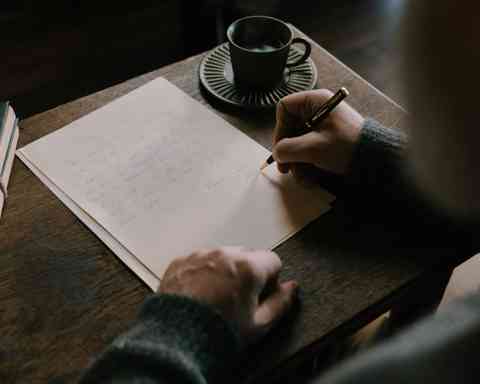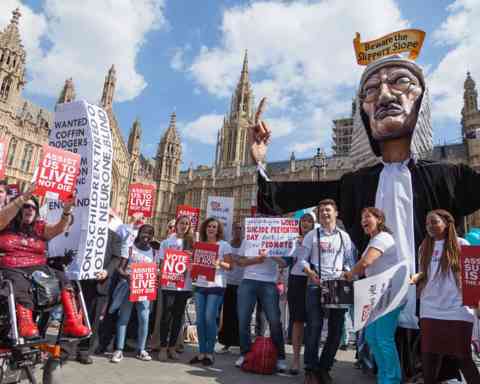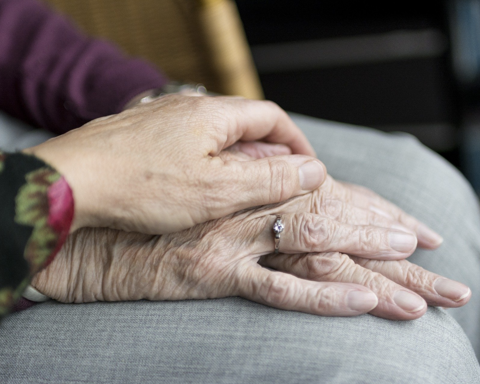Briefing Paper: Depriving People of Food & Water Despite Their Previously Expressed Religious Beliefs
Depriving People of Food & Water Despite Their Previously Expressed Religious BeliefsA recent court case concerning withdrawal of nutrition and hydration [1] sets a very worrying precedent. What follows is a brief ethical analysis of the judgement, from a Catholic perspective. This analysis does not interrogate the facts of the case as presented and should not be understood as a comment on the actual moral circumstances of any of the persons involved. The moral reality of the situation may depend on details not presented in the evidence or on details that are presented but are mistaken or misinterpreted. This is, rather, a comment on the moral reasoning shown by the judges in the case.
The case concerns “RS”, a man who suffered a heart attack on 6 November 2020 and, at the time of the initial judgement on 15 December, was still in a coma. The Court declared that it was “in RS’s best interests not to receive life-sustaining treatment, including artificial ventilation, nutrition and fluids. The result is that RS will die within a few weeks” [2]. No one can live for “a few weeks” without breathing, so this statement already anticipated that RS might recover the ability to breathe spontaneously after the withdrawal of artificial ventilation. On the return to the Court of Protection there was no more reference to ventilation but only to nutrition and hydration as examples of life sustaining treatment that it was “not in RS’s best interests” to receive [3].
In contrast, if clinically assisted nutrition and hydration were provided then RS might live “for five years or longer” [4] though, at best, in a “minimally conscious” [5] state.
What is unusual in this case, and is the reason for this comment, is that RS is described as a committed practising Catholic who had “expressed his disagreement with a widely reported case in England where the decision was to terminate medical treatment for a very small child born with serious abnormalities. He was religiously conservative, opposed to abortion, even for an unborn child likely to be medically compromised, and was opposed to euthanasia” [6].
Despite these well-attested views, which were accepted as accurate, the Court declared food and fluids not to be in the best interests of RS because he had previously stated that “he never wanted to be a burden if he was seriously ill” [7] and, in view of his wife, “he would not want his children to see him in his current condition” [8]. She also bore witness that he had said that “every life is precious and that you must hold onto life, and also that if anything happened to him, he would want all steps to be taken to save him but that if he was beyond saving he did not want to be kept alive” [9].
Interpreting past statements
The first thing to note is that the shock of these events must be very distressing to RS’s wife and family. This distress must be acknowledged. It may, however, lead to undue weight being given to certain kinds of statements – such as those about being a burden – over other statements.
The second thing to note is that the evidence stated represents the kind of things that are very common for people to say or think: Who wishes to be a burden to others? Who wishes to be seen when they are in a debilitated condition? Who wishes to be kept alive by extraordinary treatment if they are “beyond saving”? One may, quite naturally, never wish to fall into a situation of disability and dependence on others. But it does not follow that, if one unfortunately did end up in a situation of great dependence, one would as a result prefer to discontinue all treatment and even basic care. These statements therefore should not be taken to license the deprivation of food and water from someone in a coma or a minimally conscious state. In particular, someone who is strongly committed to the teaching of the Catholic Church may make these or similar statements and yet regard food and water, however provided, as part of basic care rather than a medical treatment.
In this regard it should be noted that while the predominant (though not universal) medical opinion in the United Kingdom is that there is no distinction between clinically assisted nutrition and hydration on the one hand, and medical treatment on the other, medical opinion is less relevant to the question for the Court than the opinion of patients. Many patients, and especially patients who are committed members of a faith community, regard clinically assisted nutrition and hydration as providing sustenance and not as medical treatment.
Nutrition and hydration in Catholic ethics
From a Catholic perspective, to provide food and drink to those who are hungry and thirsty is a corporal work of mercy [10]. Patients should not be abandoned to die from lack of nutrition or hydration, however that is best provided. There may be extreme cases where neither oral nor clinically assisted nutrition or hydration is effective in addressing patient needs or where they are no longer needed, as the patient is very close to natural death [11]. However, if the means of addressing the need for nutrition and hydration are effective and well tolerated and if the person is expected to live “for five years or longer” [12] then to deprive the person of food and water is unethical. It is no more or less than to starve or dehydrate the person to death.
The status of nutrition and hydration in Catholic thought was strongly presented by Pope John Paul II in the context of a patient who is not conscious:
I should like particularly, to underline how the administration of water and food, even when provided by artificial means, always represents a natural means of preserving life, not a medical act. Its use, furthermore, should be considered, in principle, ordinary and proportionate, and as such morally obligatory, insofar as and until it is seen to have attained its proper finality, which in the present case consists in providing nourishment to the patient and alleviation of his suffering. The obligation to provide “the normal care due to the sick” in such cases includes, in fact, the use of nutrition and hydration [13].
When, as in the RS case, a Catholic is known to uphold the Church’s teaching on pro-life issues and is not known to dissent from the Church’s teaching on these issues, then this should guide the interpretation of the person’s previous statements. In this context, rejection of being “kept alive” when “beyond saving” most naturally refers to rejection of intensive medical treatment and ventilation where there is no hope of recovery, not to rejection of nutrition and hydration where they are effective in sustaining life.
The Court of Appeal noted that expert opinion on the view of the Catholic Church was not thought appropriate in this case [14]. This is regrettable. Had such evidence been presented it might have helped the interpretation of the remarks made. It seems that all the judges in the case took for granted that statements about sustaining life referred equally and without distinction to medical treatment and to food and fluids. Rejection of life sustaining treatment by a Catholic patient should not be presumed to include clinically assisted nutrition and hydration unless explicitly stated. The law was already distorted by the Bland case which allowed clinically assisted nutrition and hydration to be withdrawn for (what some of the Law Lords regarded as) the purpose of ending life [15]. The grave danger of this judgement is that committed Catholics and those who hold a similar view about the human significance of food and drink may be starved and dehydrated to death against their will.
On being “a burden”
A final point, and perhaps the most concerning element of all in this judgement is that the Court takes statements about not wishing to be “a burden” to others as a valid reason to deprive the person of life-sustaining treatment or care. This conception of feeling oneself a burden needs to be challenged. The idea that those who receive treatment, care or sustenance are a burden on those who provide it is deeply insidious, though regrettably common. The oppressive effect of this idea on disabled people is illustrated by a story related by the Australian Catholic bioethicist Nicholas Tonti-Filippini:
For several years, until I objected, I received from my health insurer a letter that tells me how much it costs the fund to maintain my health care. I dreaded receiving that letter and the psychological reasoning that would seem to have motivated it. Each year I was reminded how much of a burden I am to my community. The fear of being a burden is a major risk to the survival of those who are chronically ill [16].
All members of society are dependent on others to a greater or lesser degree and society exists for the good of all its members. If someone is physically ill but conscious then their feeling of being a burden can be addressed by carers and loved ones assuring them that their lives remain valuable and they are not regarded as a burden. If someone has rashly made a legally binding advance decision to refuse clinically assisted nutrition and hydration, and is now unconscious, then very unfortunately in current law, it might not be possible to show them this care. However, where these previous thoughts were expressed only verbally or informally as fears then we show that these fears were unfounded by willingly giving this care. If a patient has previously expressed a wish “not to be a burden if they should become seriously ill”, and is now unable to communicate, then we best honour this prior wish by providing good quality care, including food and fluids by clinical assistance if required, without considering such care to be a burden.
To use this dangerous interpersonal concept of fear of becoming a burden to others as a criterion for depriving someone of food and water is to confirm someone’s worst fears. The reasoning used in this case is therefore contrary to fundamental ethical principles of equality and solidarity and will be deeply worrying to many people.
David Albert Jones
Director, Anscombe Bioethics Centre
[1] B v University Hospitals Plymouth NHS Trust & Anor (Rev 1) [2020] EWCA Civ 1772 (23 December 2020).
[2] Ibid., 2.
[3] [2020] EWCOP 69, 2 (i).
[4] Ibid., 5.
[5] Ibid.
[6] Ibid., 8.
[7] Ibid., 7.
[8] Ibid.
[9] Ibid.
[10] For example Thomas Aquinas, Summa Theologiae, 2a2ae 32 art 2, based on Matthew 25:31-40.
[11] See A Practical Guide to The Spiritual Care of the Dying Person. The Catholic Bishops’ Conference of England & Wales, Dept. for Christian Responsibility & Citizenship London: CTS, 2010, 2.6-2.10: https://bioethics.org.uk/educational-resources/guides-publications/a-practical-guide-to-the-spiritual-care-of-the-dying-person/
[12] Op. cit., [2020] EWCA Civ 1772, 5.
[13] John Paul II Address on Life-sustaining treatments and the vegetative state (20 March 2004), 4: http://www.vatican.va/content/john-paul-ii/en/speeches/2004/march/documents/hf_jp-ii_spe_20040320_congress-fiamc.html
[14] Op. cit., [2020] EWCA Civ 1772, 19.
[15] See for example J. Finnis “Bland: Crossing the Rubicon?” (1993) 109 Law Quarterly Review 329; J. Keown “Restoring Moral and Intellectual Shape to the Law after Bland” (1997) 113 Law Quarterly Review 481; A. Fisher “On not starving the unconscious” New Blackfriars 74.869 (1993): 130-145.
[16] N. Tonti-Filippini, About Bioethics, Volume 2: Caring for people who are sick or dying. Ballan, VIC: Conor Court Publishing, 2012, page 112, see D.A. Jones “Last Days: Caring for the Terminally Ill” Humanum 2018 Issue 4. https://humanumreview.com/articles/caring-for-people-who-are-sick-or-dying
Most recent
Euthanasia & Assisted Suicide: Writing or Speaking to your Elected Representative
25 October 2024
A Guide on how to write to write to your MP (if resident in the UK, Deputy (if in Ireland), or MSP (...
Eight Reasons Why We Must Not Legalise ‘Assisted Dying’
25 October 2024
A short summary of some key arguments against legalising assisted suicide.
Anscombe Centre Briefing – Consultation on Assisted Suicide in Scotland
17 July 2024
Our Guide to the 07 June 2024 to 16 August 2024 Scottish Consultation on the Assisted Dying for Term...
Support Us
The Anscombe Bioethics Centre is supported by the Catholic Church in England and Wales, Scotland, and Ireland, but has also always relied on donations from generous individuals, friends and benefactors.



